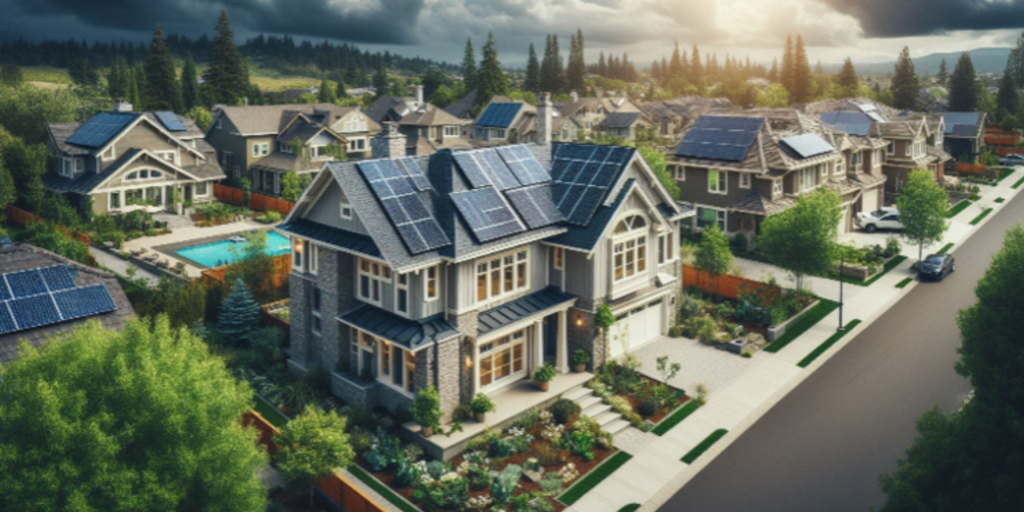
Do Solar Panels Work on Cloudy Days? Busted Myths and Maximizing Output
Solar energy is a rapidly growing green giant in the energy sector. But a common question lingers in the minds of potential solar panel owners: how well do they perform when the sun takes a vacation behind the clouds?
While sunshine is their fuel, solar panels don’t shut down completely on cloudy days. That’s right! They continue to generate electricity, although at a lower efficiency. Here, we’ll unveil the facts behind solar panel performance in cloudy weather, debunk some common myths, and explore ways to maximize your solar power generation even on less-than-sunny days.
Cloudy Days? No Problem! Solar Panels Still Shine
There’s a misconception that solar panels become useless under a cloudy sky. The truth is, they can still harness energy from diffuse sunlight, generating anywhere from 10% to 25% of their usual output on overcast days. This percentage can vary depending on factors like cloud thickness, location, and the quality of the panels themselves.
High-efficiency panels are your champions for cloudy conditions. These superstars often use advanced technology to capture a wider range of light, including UV rays, keeping your energy production up even when the sun isn’t at its brightest.
How Clouds Affect Solar Power Generation
Think of clouds as sunglasses for the sun. They don’t completely block sunlight; they just reduce its intensity reaching the panels. Even on heavily overcast days, some sunlight filters through, and high-quality panels can grab onto it more effectively with their enhanced light-capturing abilities.
Some solar cells are designed to go beyond just visible light, capturing UV rays as well. This broadens their reach for energy production in various weather conditions. Investing in these cutting-edge technologies ensures you get the most out of your solar panels, rain or shine.
Strategies for Optimal Solar Production on Cloudy Days
While sunshine is ideal, don’t be discouraged if your area experiences frequent cloud cover. Solar panels can still be a game-changer! Here are some tips to maximize your solar production:
Size Up Your Solar Array:
Consider going 25-35% larger with your solar array to account for lower yields on cloudy days.Embrace the North-Facing Roof:
Don’t have a south-facing roof? No worries! North-facing panels can capture diffuse light, adding to your overall energy generation.High-Efficiency Panels for the Win:
Invest in high-efficiency, high-wattage panels to compensate for decreased sunlight intensity.East Meets West:
Capture morning and afternoon sun by installing east/west facing panels for maximum exposure throughout the day.Solar Battery Backup:
For uninterrupted energy even during extended cloudy periods, consider incorporating solar battery storage to store excess power generated on sunny days.
When Do Solar Panels Produce the Most Energy?
Solar panels are like tiny power plants that get to work whenever sunlight is available. Their peak performance hours are typically in the late morning and early afternoon when the sun is high in the sky. The amount of energy they produce depends on various factors like season, location, and panel orientation.
Spring, summer, and fall bring longer daylight hours and more direct sunlight, resulting in higher solar output. Even winter, with its shorter days and less intense sun, can still contribute significantly, especially in areas with reflective snow that can boost panel efficiency.
South-facing panels tilted at an optimal angle receive the most direct sunlight throughout the year, but don’t forget – even on cloudy days, ambient and reflected light ensures your solar panels keep generating electricity.
Common Myths Debunked: Solar Panels and Cloudy Days
Despite the evidence, some myths persist about solar panels on cloudy days. Let’s clear the air:
Myth:
Solar panels don’t work at all on cloudy days.
Fact:
Solar panels generate electricity from diffuse light on cloudy and rainy days, though at a lower efficiency.
Myth:
Cloudy weather makes solar power unreliable.
Fact:
Advanced forecasting and grid integration techniques ensure a reliable solar energy supply even on cloudy days.
Myth:
Solar only works well in the sunniest locations.
Fact:
Modern solar panels can provide clean energy and savings in locations with average sunlight levels, provided proper orientation and tilt are used.
Conclusion: Solar Panels - A Beacon of Hope for a Sustainable Future
Solar panels remain a powerful and viable renewable energy solution, even in cloudy conditions. While their performance may be slightly reduced during overcast weather, they continue to generate electricity, offering environmental and financial benefits year-round. By using high-quality, high-efficiency panels and implementing strategic installation practices, you can
maximize your solar energy production and become a champion for a sustainable future. As the world strives for a cleaner energy landscape, solar panels stand as a beacon of hope, offering a reliable and eco-friendly alternative to traditional energy sources.
Ready to explore the potential of solar for your home? Schedule your FREE consultation with a Solar Energy expert. Let’s light up your home with sustainable energy, even on cloudy days or winter season! Call us at +18334786669 or visit our website sunlifenow.com to book your consultation now.
FAQs
Q: Do solar panels work on cloudy days?
Ans: Yes, solar panels continue to generate electricity during cloudy weather, although their efficiency may be reduced.
Q: Which type of solar panels perform best in cloudy conditions?
Ans: High-efficiency panels are better suited for cloudy environments as they can maintain performance even with limited sunlight.
Q: How much sunlight do solar panels need to operate efficiently?
Ans: Solar panels ideally require a minimum of five hours of direct sunlight daily to maximize efficiency.
Q: Can clouds enhance solar panel performance?
Ans: Yes, clouds can diffuse sunlight and enhance panel performance by reflecting or magnifying indirect sunlight.
Q: Are solar panels still worth investing in for regions with frequent cloud cover?
Ans: Despite variations in weather, solar panels remain a sustainable and cost-effective energy solution for regions with cloudy climates.



